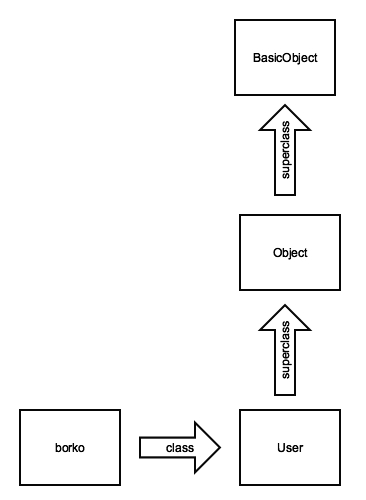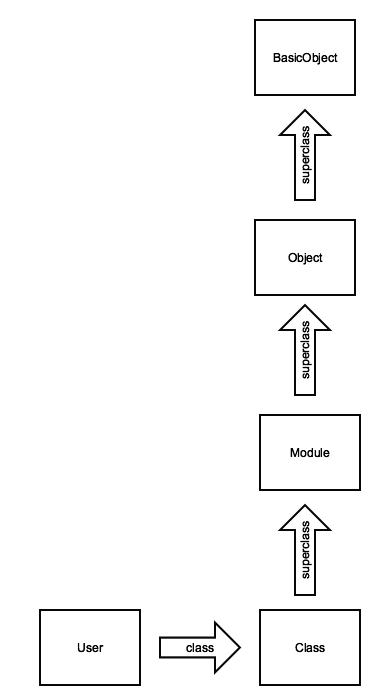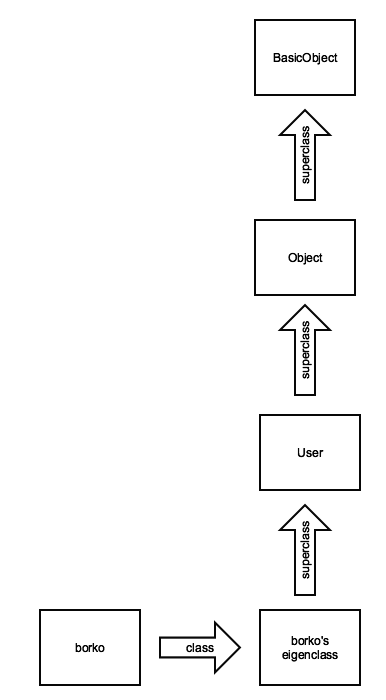RubyTalks.first
Damir Svrtan
Methods you thought were keywords
Keywords?
Reserved words?
Built-in functions?
print()
Builtin function in Python and PHP
But a regular method in Ruby
print everywhere
print 'Starting our program!'
class User
print 'Defining the User class'
def initialize
print 'Registering a new user'
end
endBut how?
Is it a special global method? NO
class User
def initialize(name)
@name = name
end
def name
@name
end
end
borko = User.new('Borko')
Down to basics
Ancestor chain
User.ancestors
=> [User, Object, Kernel, BasicObject]
class Student < User
end
Student.ancestors
=> [Student, User, Object, Kernel, BasicObject]What's a superclass?
Student.superclass
=> User
User.superclass
=> Object
Object.superclass
=> BasicObject
BasicObject.superclass
=> nilOk, so where are borko's methods defined?
In it's class and all the ancestors of course!
one step to the right, then up!

Method lookup is done through the ancestor chain

again, one step to the right, then up!
What about the User class?
borko is an instance of the User class
User class is an instance of Class class
We can also define methods on the instance
Unlike other users, Borko can sing!
borko = User.new('Borko')
zdenko = User.new('Zdenko')
def borko.sing
puts "I'm singing in the rain!"
end
borko.sing
=> "I'm singing in the rain!"
zdenko.sing
=> undefined method `sing' for #<User:0x007fc8320bc528>Eigenclass
The Eigenclass keeps all the singleton methods of an object
Hooks right into the ancestor chain

Does this syntax look familiar?
def borko.sing
puts "I'm singing in the rain!"
end
class User
def self.new_from_omniauth(email)
...
end
endEver done sumthin' like this?
class User
class << self # What is self?
# Defining the method on the eigenclass of self
def new_from_omniauth(email)
...
end
end
endOr like this?
class User
class << self
def new_from_omniauth(email)
...
end
end
class << User
def new_from_omniauth(email)
...
end
end
def self.new_from_omniauth(email)
...
end
def User.new_from_omniauth(email)
...
end
end
class << User
def new_from_omniauth(email)
...
end
end
def User.new_from_omniauth(email)
...
endWhere is print defined?
show-source Object#print
From: io.c (C Method):
Owner: Kernel
Visibility: private
Number of lines: 6
static VALUE
rb_f_print(int argc, VALUE *argv)
{
rb_io_print(argc, argv, rb_stdout);
return Qnil;
} Object.ancestors.include? Kernel
=> trueBack to square one
print 'Starting our program!'
class User
print 'Defining the User class'
def initialize
print 'Registering a new user'
end
endUser
#<User:0x007f987>
main
Back to square one
class User
end
User.class
=> Class
User.class.ancestors.include? Object
=> true
User.class.private_instance_methods.include? :print
=> true
borko = User.new
borko.class
=> User
borko.class.ancestors.include? Object
=> true
borko.class.private_instance_methods.include? :print
=> true